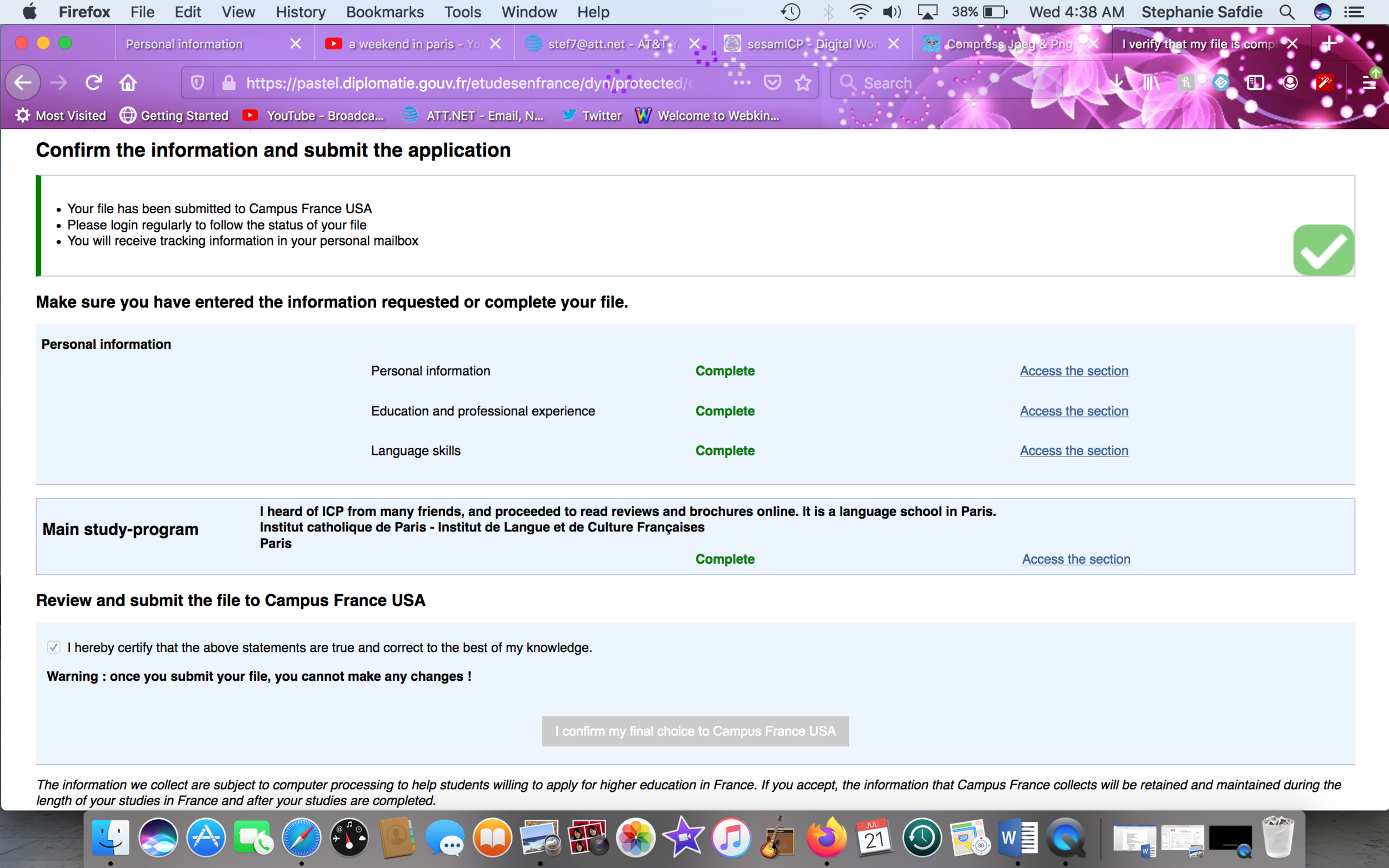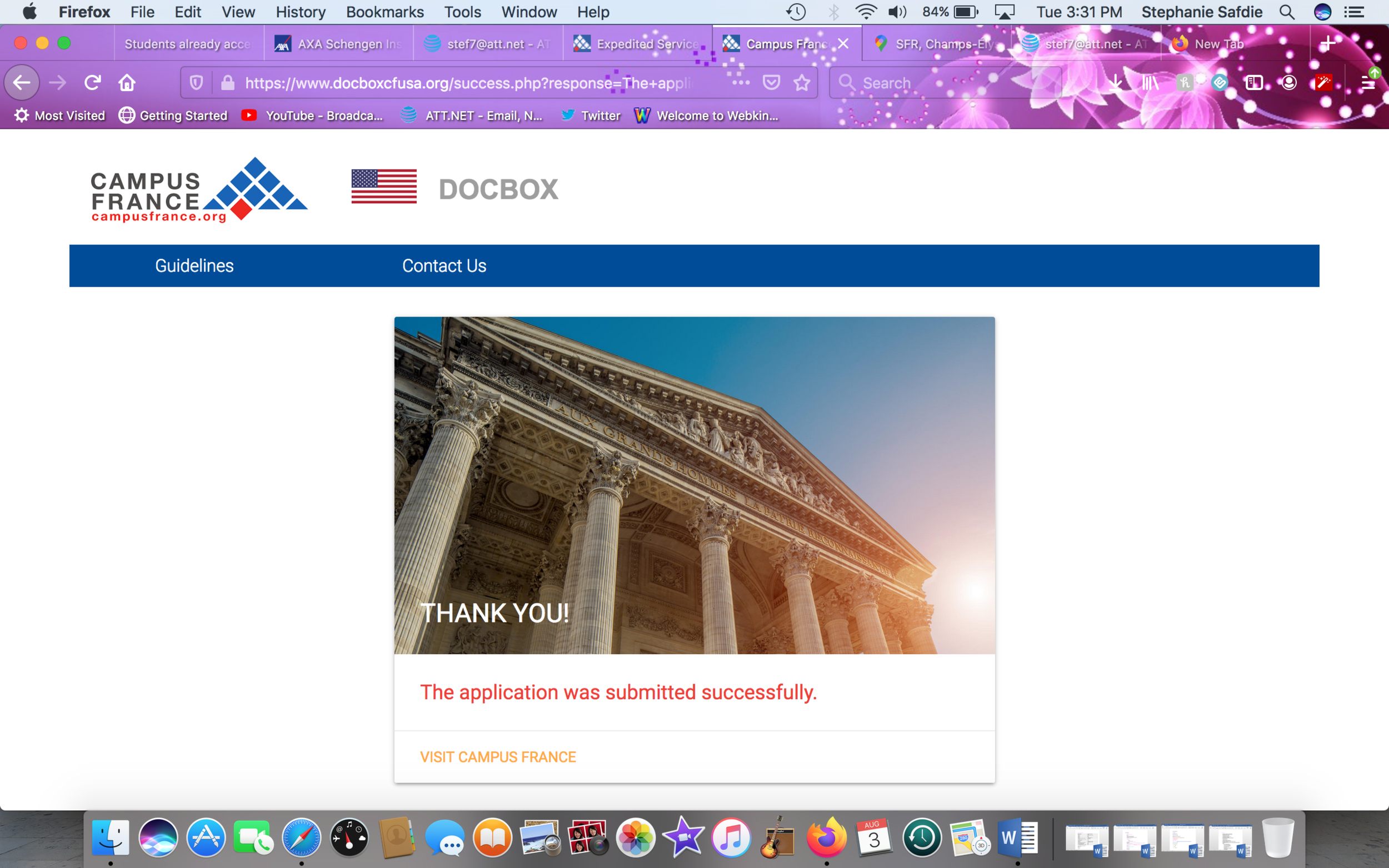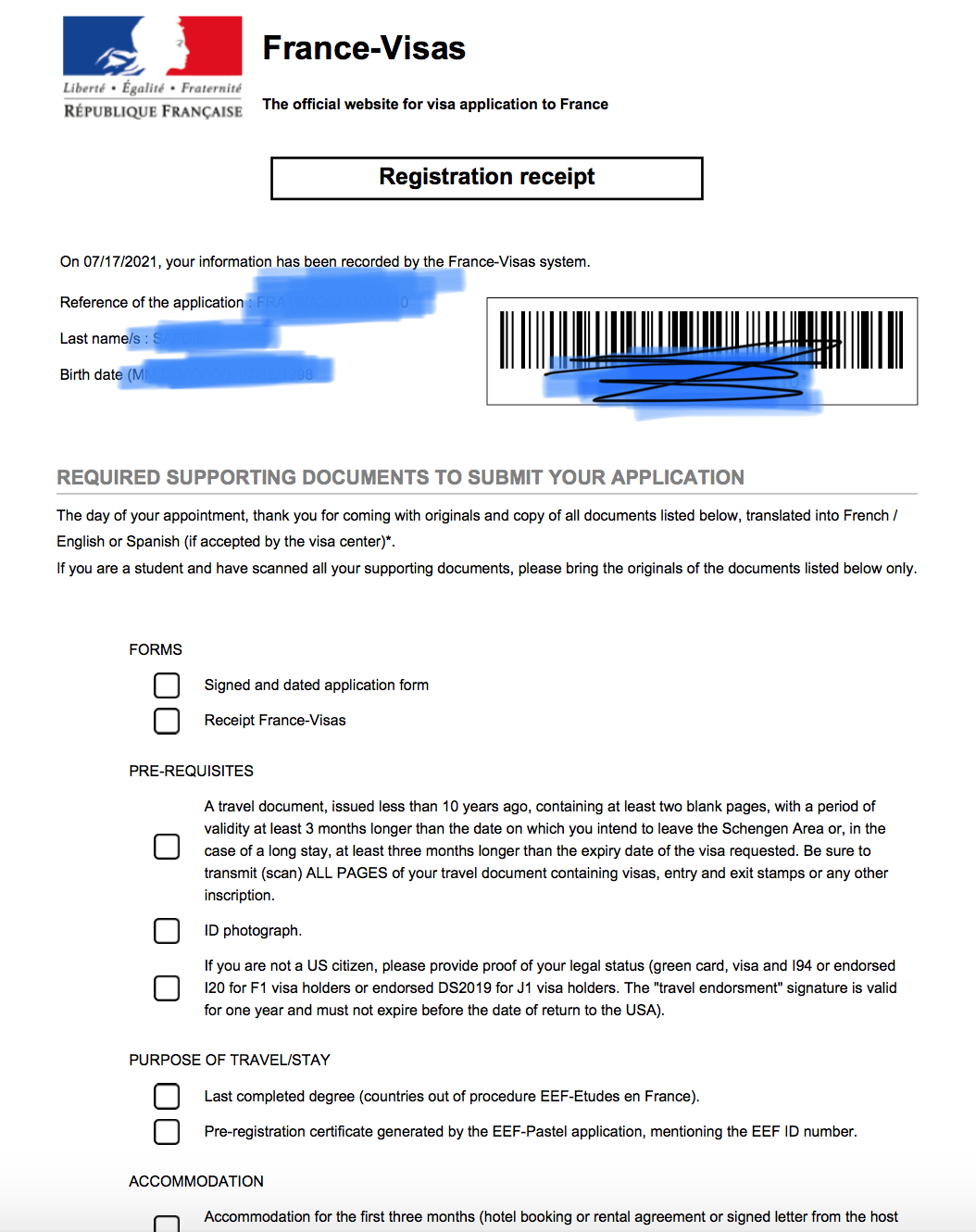How I Got My France Student Visa: Step-by-Step Guide!
Visas are tricky. Okay, I’m sugarcoating it– visas are a monstrous headache that are debilitating unlike anything else I’ve yet to experience in this world.
However, drama (but still very valid!) aside – getting a visa can be pretty straightforward if you are prepared with all of the right documents.
I’m going to tell you step by step how I got my student visa for France and what I recommend to do if you’re about to do the same.
I hope this student visa guide serves you well!
Step 1: Pick a School & Enroll
For a student visa to be valid, you need to be enrolled in classes for a minimum for 20 hours per week. During the COVID-19 pandemic, the embassy got even stricter with what schools qualified for a student visa – so to be safe, I picked a school with the “qualite FLE” label to ensure that if there were to be any more shut downs, that my visa category wouldn’t be unavailable to me.
I enrolled in school in July, I got my pre-registration certificate for both semesters. Hold on to these, as well as proof of payment for the school.
I suggest starting a folder or binder to keep all of your documents in order.
Step 2: Apply to Campus France
France really likes to make you jump through hoops. Not only do you have to apply at the closest VFS center near you, but you need to get approved by Campus France.
Unfortunately, they are not currently offering their expedited services. So plan wisely.
Also… for the love of the universe, don’t make the same mistake that I did. Campus France’s application process is not clear. I thought I had finished my application process after clicking “submit” and viewing this page:
But I was not done. I had to go to https://www.docboxcfusa.org/and not only pay the fee (which I had done), but you have to scroll down again and click another submit button.
I almost messed up my entirely timeline until one day it had crossed my mind that I may have done it wrong.
Don’t be me – do it right the first time!
I started to stress that I wouldn’t make it in time for my visa appointment (which I had booked before completing the Campus France procedure) but I just emailed Campus France (natalie.cox@frenchculture.org) my concerns and they suggested I keep my appointment and they would try to proceed with the processing of my application as soon as possible.
The next day, the lady called me for my phone interview and I was approved a couple of hours later.
Some of the questions she asked me were:
What is your motivation for choosing France?
What do you see yourself doing after this program is completed?
What is your motivation for picking the school that you did?
What do you see yourself doing five years from now?
A lot of my friends told me to be prepared that if they asked me to work, to answer, “I would like to work, because I think it would be a unique and irreplaceable opportunity to better immerse myself into the French culture, and better learn the language than I ever could in a classroom”. In other words, don’t put too much emphasis about working in France.
I answered many of the questions honestly. I spoke about my long love and familiarity of France. I told her I honestly had no idea what I intended to do after the program, because as many of us have learned the past couple of years – life is unpredictable and I don’t know how anyone can plan a year in advance, let alone five years in advance. I told her my motivation for picking the school was its value in international networking and how it resonates with me due to my love of travel, and that this was an experience I wanted to give myself since I commuted during college while completing my Bachelor’s Degree and didn’t have a very “typical” college experience.
I blabbered off a million things I might do a year from now: “maybe I’ll find a job in France and want to stay, maybe I’ll take some time off to travel, maybe I’ll work on my writing or YouTube videos, or maybe I’ll end up pursuing a master’s degree at the same school I am attending the French courses for now…”
Though in the moment I was terrified that my lack of “a plan” would get me denied, it seemed to help me appear more human. Just be confident when you speak and sound sure of what you’re saying; you can easily prepare with the questions I shared with you above.
Step 3: Get a Visa Appointment
So, I actually booked my visa appointment before completing the Campus France procedure, because in July of 2021 the appointments were booked full for 3-4 weeks in advance. I was ecstatic when I got an appointment for three weeks and a half weeks from the day I booked it.
Near the end of the wait leading up to my visa appointment, I checked the calendar in case I needed to reschedule in case Campus France didn’t come through in time.
The calendar showed there was a lot of availability, but nevertheless – the day of, the VFS office was still busy. I suggest booking your appointment 3-4 weeks after you’ve officially submitted your Campus France paperwork.
Worst case scenario, you can change your visa appointment up to one time before you must pay again.
Step 4: Prepare Your Documents & Attend the Appointment!
If you prepare your documents as you go, you won’t have to do much preparation close to your visa appointment. Think of studying a little bit every day of the week before a final exam: the concept is the same here.
According to VFS, this is the official list of documentations that you need in order to acquire a student visa for France:
- Signed and dated application form from https://france-visas.gouv.fr/en_US/web/france-visas/
o P.S. – If you accidently have a typo, simply crossed it out with a pen or pencil, handwrite the correct information in, and then initial (including your middle name; the full name on your passport) next to where you made the correction. The VFS lady seemed stunned I had already known to do this… little did she know this wasn’t my first try for a French visa!
- The receipt you will receive after submitting the application online. It will look like this:
- Originals + a copy of your passport/travel document that was issued less than 10 year ago, with at least two blank pages where it says “visas”
- ID Photograph (my passport sufficed for this category)
- Last Completed degree outside of Etudes en France [EFF] (I attached a transcript and my diploma for my Bachelor’s Degree)
- Pre-registration certificate (this is the campus france approval email; print it out & bring it to the appointment! I printed the proof that I paid Campus France as well).
- Accommodation for the first 3 months
o This can either be a rental agreement (what I had), an Airbnb/hotel (you can book for three months and then cancel after you receive the visa) or a signed letter from someone in France saying they are willing to host you for the first 3 months of your stay in France + copies of their rental agreement/bills to show proof they live their + their ID/passport/visa.
- Proof of Funds, and apparently – this is the most common reason why a student visa is rejected. Therefore, this is the category I went the most overboard on.
o You must show you have at least 615€ per month for your stay; around $820 USD. So, if your stay is for 12 months, you need to show $9,840 accessible to you.
o I had my dad fill out a sample letter (shown below) confirming that he will financially support me during my stay in France. I gave paper originals of his last three bank statements, as well as the past three months of his fidelity investment account. You must take this form to your bank and get it notarized. Don’t sign it beforehand – the bank is supposed to watch you sign before they notarize the form.
o I also showed the last three bank statements of my own bank account to prove I had my own funds as well.
- Additional Documents
o At the end, the person assisting you will ask if you would like to submit anything else with your application. I decided to attach additional documents to prove how prepared I was: such as my Schengen Area Travel Insurance for the year, my flight ticket, a scanned copy of my birth certificate, and social security number. I offered my CV/Resume as well, but the lady at VFS said it wasn’t necessary.
o You will also need a Schengen visa photo! I went to CVS the year before to get these photos done. The funny thing is, when I tried for a different visa last year – they took my photos and said all was fine. However, this time – the lady said that although the dimensions were right, that it wasn’t an acceptable photo because my hair wasn’t tucked behind my ears. Keep this in mind if you decide to get your photos elsewhere; I ended up having to take my visa photo at the appointment – but I was grateful that that was my only misstep in the process!
You will not get any of the documents you submit back (besides your passport with your visa in it, obviously). I suggest you make multiple copies of anything you would like to have, and to avoid having to pay to have it copied at a VFS office.
I highly recommend preparing your documents in this order. The lady who prepared my application said I came very well prepared (she was asking me for each document in the order I just listed to you above, and because I had already organized them in this order, it was a breeze to hand her each document as she asked), and it felt great to smile and say, “Yes, I did!”
After you pay the visa fee and submit your documents, you will go into a room for biometrics for fingerprinting.
And then you’re done!
You’ll receive a tracking number to check the status of your application, and then a FedEx tracking number for your passport to return to your house (as of August 2021, VFS is not allowing passport pickup; even in the Washington D.C. office).
My visa arrived exactly one week after my appointment.
Et voilà!
Step 5: Pack and Prepare for France
Now that you’ve got your visa, comes the fun (but still stressful) part.
Preparing to fly off to France!
Here is a checklist of some things to do before heading off:
- Cancel any unwanted subscriptions that won’t work in France (i.e., thrive market or any other mail service subscription)
- Book Schengen travel insurance: I do AXA
- Traveler’s insurance; I like World Nomads and have used them for my travels in Europe, Japan, Australia, Israel, and New Zealand. A more extensive list of travel insurances that may work for you during these uncertain times can be found here: https://money.com/best-travel-insurance/
- Renters insurance for your apartment in France: Renter’s Insurance is required in France. Some popular and easier options for expats include lemonade, luko, direct assurance, and home umbrella.
- Make copies of any important documents: such as your visa, your birth certificate/social security number, and medical records to take to France in case of an emergency
- Prepare any health forms necessary: a company like ivisa.com can help you with this, as well as other visa applications and U.S. passport renewals!
- Back up any technology before traveling: like your phone, laptop, or tablet.
- Buy anything in your home country that will be hard to find in France: like vitamins, small wash cloths, and everything but the bagel seasoning!
- PACK…duh. If you want my tips for how I pack when I travel, click here.
Bon voyage!
Be sure to subscribe to my YouTube Channel to see my life in France in action :)
à bientôt,
Stephanie





